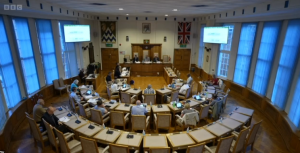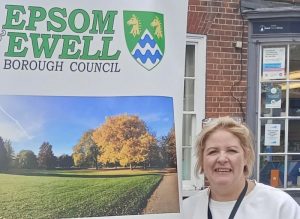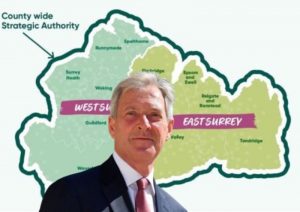Posted in the order of receipt.
From Cllr Alex Coley (Independent Ruxley)
Dear Editor,
It is disingenuous to go to residents with a consultation that shows a band D precept of £43.52 (rounded up to £44), when this could be more than six times higher. The Council’s own figures add up to a Band D precept of £296.62 for Epsom Parish Council, when certain key community assets are transferred. This is due to the enormous burden of running costs (£73.10) and building repairs (£180).
You will hear that this consultation is simply for the creation of new parish councils dedicated to representing residents’ voices and the statutory provision of allotments. That is a Trojan Horse. Seeking a view from residents on a lower figure and then multiplying it several times later is deeply misleading. These additional costs are very likely to be even higher than shown as they are based on out-of-date running costs reported in February 2024 and building repair costs from July 2019.
Residents who worry about their area being left behind will discover that creating a new parish council opens up the opportunity for the forthcoming unitary councils to offload costly buildings. With an uncapped precept, residents can be made to pay for these offloaded buildings — whatever they cost. This can happen at ANY time AFTER the new parish council is created. The one thing that definitely won’t be left behind is your money. I am seeking further analysis to calculate itemised costs for all the many buildings, parks and open spaces which could be transferred in future years, adding to the parish precept even further.
Using figures in the Council report from 9th December, these are the expected Parish Tax bands for Epsom when the three key community assets are included after the consultation has closed.
Band A — £197.75
Band B — £230.70
Band C — £263.66
Band D — £296.62
Band E — £362.53
Band F — £428.45
Band G — £494.36
Band H — £593.24
Residents are being treated like Turkeys. Not just voting for Christmas, but paying for Christmas too!
Yours faithfully,
Alex Coley (Independent – Ruxley)
From Cllr James Lawrence (Liberal Democrat, College Ward)
Dear Editor,
I would like to remind readers that this consultation is to set up two parish councils, that will only manage allotments. That is the only service proposed to be provided to residents. Of the 11 allotment sites in the borough, the council currently runs only 7. Some wards for which councillors are proposed don’t even have any allotments in them. Before addressing the clear ambition to further expand responsibilities and costs, as indicated by “could work with East Surrey Council in the future to undertake any services which it is agreed may be better run at a local level, such as parks, open spaces and community buildings etc.” I will first focus specifically on the proposals as written.
The consultation document (appendix 4 of 9 Dec 2025 Full Council papers item 11) on pg 8 states that “the budget essentially covers” two key things: “Parish Council Administration” and “Allotments”. What is not explained anywhere in that document is the fact that of the total collective cost of £1.52mil, only £0.02mil is required for the management of the 7 allotment sites. This is the only part of the precept (the new tax) that may possibly relate to the suggested ambition to “improve community engagement, local democracy, and service delivery” (pg 2 of appendix 4), and even then only for the few hundred council allotment holders. At only 1% of the proposed cost, the “local democracy” part of the extra tax is at best a rounding error on the amount you will pay.
As has been indicated, in reality it is highly unlikely that the parish precept will remain at ~£45. What is the future projection of this additional tax? We will receive no discount on our unitary council tax rates. The council’s own papers (appendix 7) predict significant rises to the tune of ~£220 above the £45 for a Band D property if the three big community assets of Bourne Hall, Epsom Playhouse and the Community & Wellbeing Centre are included. Why are none of these future expectations and cost breakdowns not included in the consultation document? I will leave the reader to decide.
Yours faithfully,
Cllr James Lawrence (LibDem College)
From Cllr Bernie Muir (Conservative, Horton Ward)
Dear Editor,
The white elephant of parish councils is an exercise in self-indulgence and self-interest at vast expense to the Borough’s residents.
“The proposal adds an extra, unnecessary layer of cost and local bureaucracy with little, if any, benefit, especially given that all areas WILL be represented by new Neighbourhood Area Committees comprising of your Councillors, health, police and a tailored list of local groups or individuals that serve your community — a fact not mentioned in the Consultation.”
Without having determined what the Parish Councils would do, other than manage allotments thus what it would cost, other than ‘considerably higher’ than the initial charge, they are asking residents their view on setting up two costly councils based on effectively no, or missing, information.
The maths reveal that lack of value — The council quotes an additional cost of £44–£46 for the first year (for a Band D property) to cover the cost of maintaining allotments, despite this costing only 60p per household with the rest of the precept, some 99% of the first-year charge, going on administrative costs.
The average cost per property would actually be almost 20% higher at £53 in the first year, exceeding the figures quoted in the consultation (around £45). That is because the average property in Epsom and Ewell is Band E, not the quoted Band D figure. The actual cost in the first year would vary between £30 (Band A) and over £90 (Band H).
However, that is only the tip of the iceberg.
The council has ambitions to take on much, much greater costs, all of which would be charged to residents as an additional council tax ‘precept’ in future years. The first three assets being considered for transfer to the new parish councils would alone increase the average additional precept cost per property in Epsom to around £350, with costs for Epsom households varying from £198 (Band A) to over £590 (Band H, Epsom) based on the council’s figures.
The council’s own public report pack goes on to state ‘If other community assets (e.g. country parks etc) were to be transferred, the costs would be considerably higher’. Even £590 per year could go considerably higher! All this is on top of the standard council tax charge. Whilst borough council tax rises were capped at 3% each year, there is no cap at all on parish council precepts.
Before responding to the consultation, I encourage residents to ask themselves what, specifically, the proposed parish councils are going to provide, and whether it is worth the large, increasing and uncapped costs.
Yours faithfully,
Cllr Bernie Muir (Conservative Horton)
Vice-Chairman Surrey County Council
Surrey County Councillor — Epsom West Division
Epsom & Ewell Borough Councillor — Horton Ward
From Cllr Hannah Dalton (RA Stoneleigh) leader of the ruling Residents Associations Group on Epsom and Ewell Borough Council
Dear Editor,
Epsom & Ewell Borough Council is not alone in making the decision that, as a result of Surrey local government reorganisation, there is an urgent need to review or establish Community Councils (also known as Parish or Town Councils). This work is also being undertaken by Guildford Borough Council, Mole Valley District Council, Reigate & Banstead Borough Council, Runnymede Borough Council and Surrey Heath Borough Council.
From July to October 2025, Epsom and Ewell Borough Council conducted the first resident consultation on the proposal to establish Community Councils, and 67% of respondents were supportive of the proposal. As a result of the consultation, and listening to our residents, further work has been carried out and the Council is undertaking a second and final resident consultation from December 2025 to February 2026.
It is disappointing that the Labour, Liberal Democrat, Conservative and Independent groups are seeking to derail this work and, in doing so, deny the residents of Epsom and Ewell the second consultation to make an informed decision on whether to proceed with establishing two Community Councils. To my mind, this is another example of political parties denying residents their democratic voice — which we have already seen through the cancellation of the Surrey local elections due to take place in May 2025, and more recently, through not listening to the resident voice in the consultation on Surrey local government reorganisation, where residents were vehemently opposed to the establishment of two Unitary Councils.
The case for establishing a Community Council becomes stronger when you consider what the new East Surrey Unitary Council — which will represent a population of 551,000 — will mean for democratic representation for the residents of Epsom and Ewell.
Currently, the residents of Epsom and Ewell have 35 Borough Councillors and 5 County Councillors. Following the establishment of the East Surrey Unitary Council, this will reduce to 10 Councillors for a population of 81,000; that is a 75% decrease in democratic representation. If ever there were a compelling reason to explore introducing a local Community Council, it is this.
The key areas the second consultation is seeking residents’ views on are:
- to establish two Community Councils — one for Epsom and one for Ewell
- to maintain the 14 individual wards that currently make up the Borough of Epsom and Ewell
- to propose 2 Community Councillors for each ward, elected as usual, who would all be volunteers and receive no remuneration for representing residents at a local level
- a proposed precept of around £45 a year (approximately £3.75 a month or 12p a day)
The precept would cover the new Community Councils’ administration — such as employment costs, office supplies and equipment, website and IT, insurances — but more importantly, services such as planning, because the Community Council would be a statutory consultee.
This is a pragmatic approach to the proposed introduction of Community Councils, as currently we do not know how the new East Surrey Unitary Council will function.
However, it is worth noting that evidence from areas which have already undergone local government reorganisation shows that there is a critical role for Community Councils, and that the ‘Neighbourhood Area Committees’ being proposed by Surrey County Council, in practice, do not have the requisite powers or representation to deliver for the residents they represent.
This Epsom and Ewell Community Governance Review consultation will close at 11.59pm on Sunday 1 February 2026 and can be accessed online at:
https://eebc.inconsult.uk/CGRproposal/consultationHome
Paper copies of the consultation can be found at:
The Town Hall
Bourne Hall
Stoneleigh Library
Epsom Library
Ewell Court Library
Community and Wellbeing Centre
Yours faithfully,
Cllr Hannah Dalton
From Cllr Kate Chinn (Labour Court Ward)
Dear Editor
I do not believe there is a need for community councils and they will cause additional costs for residents. There are far too many unknowns. The new unitary council is only obliged to pass on management of allotments which, if the Residents Association councillors get their way, would be two costly administration systems set up for a minimal service.
Alternatively, all the borough’s costly and heavily subsidised venues including the Playhouse and Bourne Hall could be transferred. Both need continued costly refurbishment. Costs that would be passed on to residents.
The RA- led council are clearly pushing for two parish/community councils – one for Epsom and one for Ewell. An increase of administration from the two currently representing the borough.
Yours faithfully,
Cllr Kate Chinn















